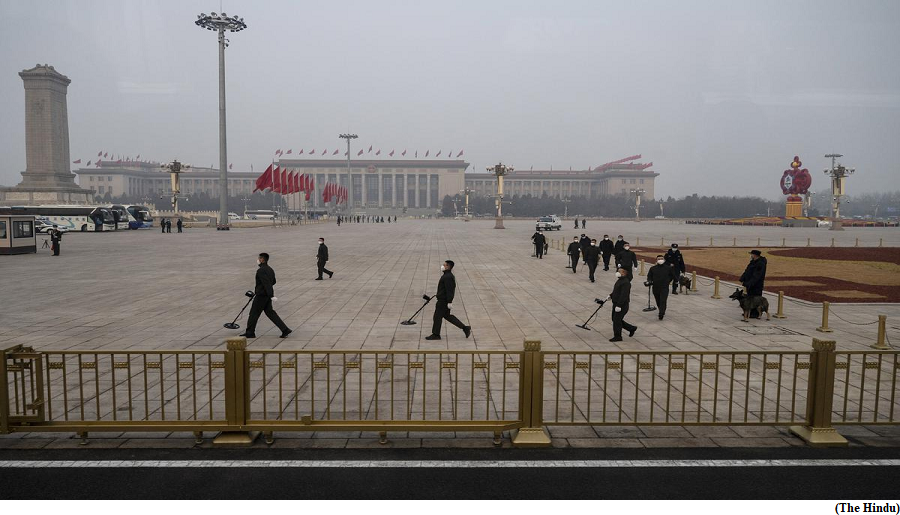India leads in laundering Russian oil and selling to Europe, report (GS Paper 2, International Relation)

Why in news?
- Recently, a report, titled, ‘Laundromat: How the price cap coalition whitewashes Russian oil in third countries’ was released by the Centre for Research on Energy and Clean Air (CREA).
Details:
- India leads five countries named as ‘the Laundromat’ countries that buy Russian oil and sell processed products to European countries, thus side-stepping European sanctions against Russia, says the report that cited the latest figures for the first quarter of 2023.
- The report, coincides with the latest data from analytics firm Kpler and a report by international agency Bloomberg that showed how European Union (EU) countries, which are all part of the “price cap coalition” that bars trade and insurance for any oil purchased above a certain price from Russia, are in fact increasing their intake of oil from India, China, Turkey, the UAE and Singapore.
- The report also accused Indian sellers and European buyers of possibly “circumventing sanctions” by selling crude products from a refinery in Gujarat that is co-owned by Russian oil company Rosneft.
- European countries are simply substituting oil products they previously bought directly from Russia, with the same products now “whitewashed” in third countries and bought from them at a premium.
Exports by India:
- Of the so-called “laundromat” countries, India, which in April remained the highest global consumer of seaborne Russian crude for a fifth month, is ahead of all others in the export of crude products to the coalition countries, exporting nearly 3.8 million tonnes of oil products to price cap coalition countries, which include the EU, G-7 countries, Australia and Japan.
- India’s exports of diesel, for example, tripled to about 1,60,000 barrels per day in March 2023, compared with the period before the Russian war in Ukraine, making diesel one of the largest components of India-EU trade at present.
- The most oil products were being exported from two ports in Gujarat: the Sikka port that services the Reliance-owned Jamnagar refinery, and the Vadinar port that ships oil products from Nayara energies, which is partly owned (49.13%) by Rosneft, alleging that this could constitute “circumventing sanctions” imposed unilaterally by the U.S. and Europe.
First test launch of new low-cost star sensor developed from off the shelf components successfully conducted
(GS Paper 3, Science and Technology)
Why in news?
- A new low-cost star sensor developed by astronomers from off-the-shelf components was recently launched by ISRO on board PSLV C-55.
- In its first-ever space test, the sensor, which is mounted on the PSLV Orbital Experimental Module (POEM), is performing well, and the initial data has now validated its design as well as its function.

StarBerrySense payload:
- The StarBerrySense payload developed by the Indian Institute of Astrophysics was launched on 22 April.
- This novel low-cost sensor designed to quickly calculate where the satellite is pointing is being tested in space for the very first time.
- It is functioning as expected, the initial data shows that it is able to calculate the pointing direction.
- It is capable of finding its pointing direction in space by identifying the stars in its field of view.
- It is built around the well-known minicomputer RaspberryPi, and the electronics and software were designed in-house.
Way Forward:
- For any space mission, it is crucial to know where the satellite is being pointed to at any given time. While there are several ways to do this, a star sensor provides the most accurate information about a spacecraft’s orientation.
China amended anti espionage law
(GS Paper 2, International Relation)
Why in news?
- Recently, China’s legislature approved amendments to China’s anti-espionage law, broadening the scope of activities related to spying and national security.
- The amendments come amid a string of high-profile cases involving journalists, foreign executives, as well as international companies in China, who have come under the lens of authorities on national security grounds.
- It emphasises the dual importance of “development and security”, rather than a focus solely on economic development.

What is China’s anti-espionage law?
- The recent amendments are to China’s 2014 anti-espionage law. Article 1 of the law says the idea behind the legislation is “to prevent, stop and punish espionage conduct and maintain national security.”
- The broad ambit of what constitutes “national security” as well as the law’s focus on involving a “whole of society” approach to counter-espionage, including from Chinese enterprises and organisations, evoked concerns among both rights groups and foreign enterprises in China.
- Foreign governments are especially concerned whether Chinese companies, particularly in the tech sector, would be mandated to offer their vast amounts of data to the authorities.
- Another article encourages ordinary citizens to take part in national anti-espionage efforts by reporting to the authorities any activity deemed to be suspicious and endangering national security.
- They have further broadened the law’s scope, with one of the changes declaring that “all documents, data, materials, and items related to national security and interests” will be protected on par with what are deemed state secrets.
- The definition of espionage has also been expanded to include cyber-attacks.
What will be the impact of the amended law?
- The amended law is likely to have a chilling impact both within China and beyond.
- Chinese journalists, academics and executives who frequently engage with foreign counterparts are likely to think twice before doing so, at least without explicit government sanction, particularly in the wake of the arrest of Dong Yuyu.
- Unrestricted engagement between Chinese and foreign scholars, which has already become limited in the Xi Jinping era, is likely to become even rarer.
- Foreign enterprises are also likely to be concerned following recent reported investigations by Chinese authorities on the U.S. consulting firm Bain & Company and a raid on the American due diligence company Mintz Group.
- Indian companies with a presence in China, particularly in sectors deemed to be sensitive such as pharma and IT, will likely need to review their exposure to risks under the expanded law and broadened definitions of “national security”, particularly amid deteriorating relations between the neighbours.




